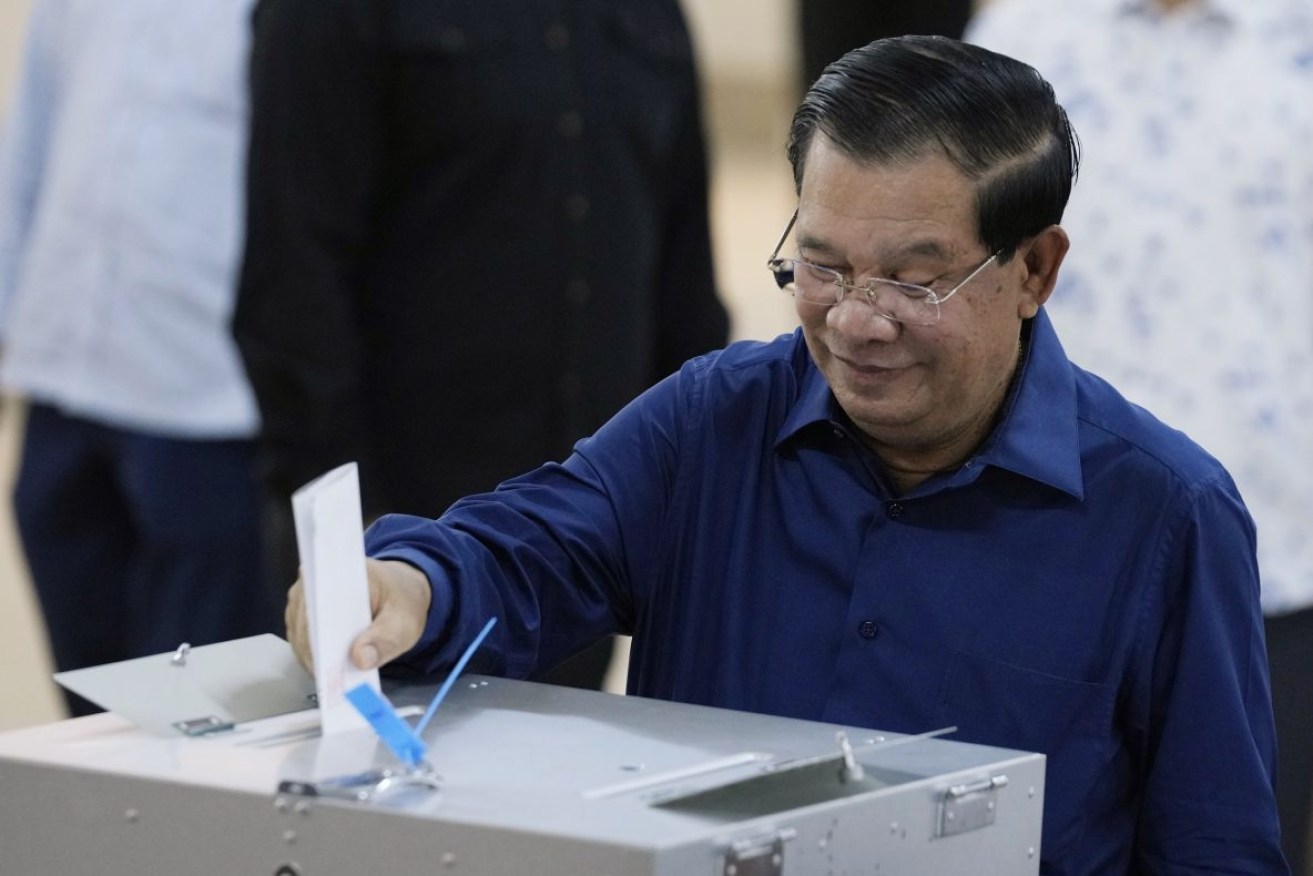Cambodia’s autocrat leader extends reign after election
The ruling party of Cambodia’s longtime Prime Minister Hun Sen has claimed a landslide victory in elections, an outcome that was virtually assured thanks to the suppression and intimidation of the opposition in a vote critics say made a farce of democracy.

Cambodian Prime Minister Hun Sen votes on Sunday. Photo: AP/Heng Sinith
Six hours after polls closed, the National Election Committee said 84.6 per cent of eligible voters had cast ballots.
Sok Eysan, spokesman for Hun Sen’s Cambodian People’s Party (CPP), said he believed his party captured 78-80 per cent of the total turnout.
“I have no results about the allocation of seats as of now but I can say that the ruling Cambodian People’s Party has won a landslide victory,” he told the Associated Press, although no official vote count had been issued.
Fresh News, a Cambodian online news service known for its close links with Hun Sen’s government, reported on its website late on Sunday night that according to unofficial results, the CPP had captured 120 National Assembly seats and the royalist FUNCINPEC party had won five.
The European Union, the United States and other countries had refused to send observers to the polls, saying the election lacked the conditions to be considered free and fair.
That left international officials from Russia, China and Guinea-Bissau to watch as Hun Sun voted shortly after the polls opened in his home district outside of the capital Phnom Penh.
He held his ballot high for all to see, before depositing it into the silver metal box and leaving the station, pausing to take selfies and shake hands with supporters outside.
The longest-serving leader in Asia, Hun Sen has steadily consolidated power with his strong-arm tactics over the last 38 years.
But, at age 70, he has suggested he will hand off the premiership during the upcoming five-year term to his oldest son Hun Manet, perhaps as early as the first month after the elections.
Hun Manet, 45, has a bachelor’s degree from the US Military Academy at West Point as well as a master’s from NYU and a PhD from Bristol University in the UK.
He is currently chief of Cambodia’s army.
“I don’t think anyone expects Hun Sen to sort of disappear once Hun Manet is prime minister,” said Astrid Norén-Nilsson, a Cambodia expert at Sweden’s Lund University.
“I think they will probably be working closely together and I don’t think that there is a big difference in their political outlook, including foreign policy.”
At the station where Hun Sen cast his ballot, voter Nan Sy, a former lawmaker himself with a smaller royalist party, said the main issue for him was stability.
“Without stability we cannot talk about education, we cannot talk about development,” the 59-year-old said without saying who he voted for.
There were few reports of any protests against the elections but General Khieu Sopheak, Cambodia’s police spokesman, said 27 people were being sought over allegations they called for voters to spoil their ballots in a Telegram chat channel.
He said there had been two arrests at polling stations as well.
Hun Sen had been a middle-ranking commander in the radical communist Khmer Rouge responsible for genocide in the 1970s before defecting to Vietnam.
When Vietnam ousted the Khmer Rouge from power in 1979, he quickly became a senior member of the new Cambodian government.
A wily and sometimes ruthless politician, Hun Sen has maintained power as an autocrat in a nominally democratic framework.
His party’s stranglehold on power faltered in 2013 elections, in which the opposition Cambodian National Rescue Party won 44 per cent of the popular vote to CPP’s 48 per cent.
Hun Sen responded by going after leaders of the opposition, primarily through sympathetic courts, which eventually dissolved the party after local elections in 2017 when it again fared well.
Ahead of Sunday’s election, the Candlelight Party, the unofficial successor to the CNRP and only other contender capable of mounting a credible challenge, was barred on a technicality from contesting the polls by the National Election Committee.
-with AAP




